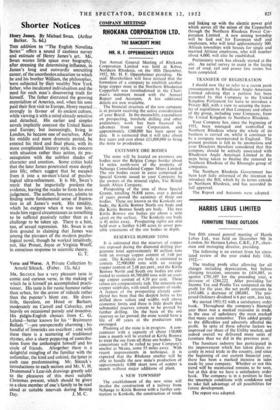Shorter Notices
11:as addition to "The English Novelists Series" offers a sound if cautious survey and estimate of Henry James's art. Mr. Swan wastes little space over biography, after stressing the determining influence, in. James's long and outwardly unexciting career, of the unorthodox education to which he and his brother WAlifun, the philosopher, were subjected by their wealthy New York father, who inculcated individualism and the need for each man's discovering truth for himself. The father distrusted the growing materialism of America, and, when his sons paid their first visit to Europe, Henry reacted .. strongly in favour of its ancient culture, while viewing it, with a mind already sensitive and detached. His earlier and simpler novels implicitly contrast the United States and Europe; but increasingly, living in London, he became one of ourselves. After his middle and more dramatic period, be entered his third and final phase, with its more complicated literary style, its concern with situation rather than action, its pre- occupation with the subtlest shades of character and emotion. Some critics hold that the later James penetrated more deeply into life; others suggest that he escaped from it into a no-man's-land of psycho- logical ultra-refinement. It is Mr. Swan's merit that he impartially presents the evidence, leaVing the reader to form his own judgement. The author, however, admits to finding some fundamental sense of frustra- tion in all James's work. His timidity, which he. outgrew when it was too late, made him regard circumstances as something to be suffered passively rather than as a challenge to be taken up. There is a hint," too, of sexual repression. Mr. Swan is on firm ground in claiming that James was among the pioneers of the modem psycho- logical novel, though he worked intuitively, not, like Proust, Joyce or Virginia Woolf, in conscious response to scientific theory.
G. T.


































 Previous page
Previous page